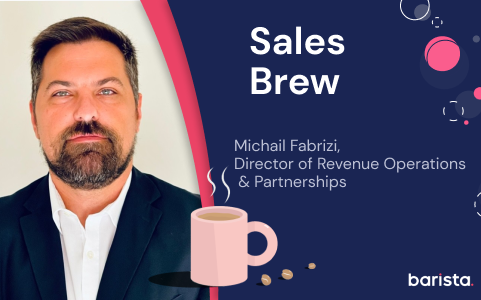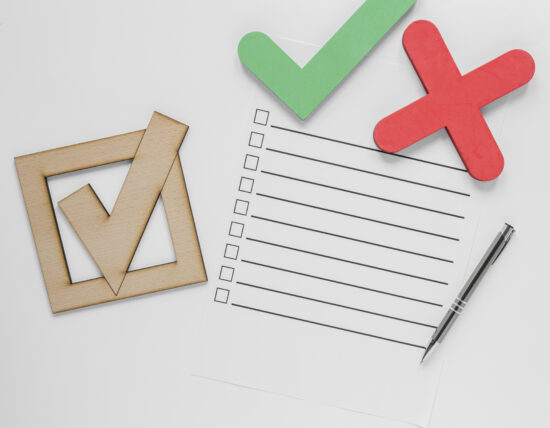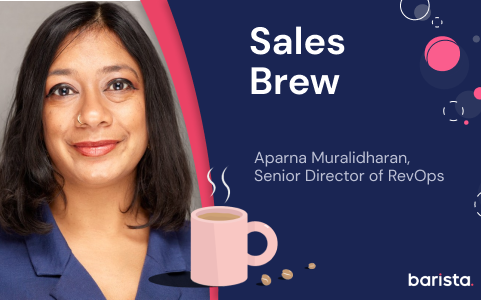Sales Brew - Morgan J Ingram, Sales Coach and Influencer at JB Sales

Roy Weinstock
For the second episode of Sales Brew by barista AI, we had the opportunity of hosting Morgan J Ingram, Director of Sales Execution and Evolution at JB Sales. Morgan is an experienced sales leader, coacher, and influencer with over 120K followers on LinkedIn. For the opportunity to hear sales discovery and demo tips from Morgan people are lined up, so just hit play and enjoy the show.
To watch the full interview and get updated on every sales brew episode, subscribe to our YouTube channel. A short version and transcription are below. Get a cup of coffee and enjoy the show!
What’s the biggest challenge in sales discovery calls?
I think the biggest challenge is figuring out what questions to ask. The discovery call often goes so fast, so you have to be very intuitive and understand exactly what’s going on. So, there are a lot of things that can be happening that you’ve missed. I think that’s the hardest thing. Figuring out what are those layering impact questions that I could be asking, soo the prospect understands that I can actually solve a problem they care about.
What’s your best sales discovery call tip?
This is going to sound very high level, but I’ll give you a tactical way to go about this. The most important thing in a sales discovery call is to have a genuine curiosity for the prospect. Now, the thing to do is five minutes before a call, look at the company’s website, look up their LinkedIn, and explore what they are doing today and how they’re being active. These are ways that you can stand out without being too crazy. This way you can just continuously impact the people that you are looking to talk to and have a clear meeting goal.
When you’re in a conversation, there are words that people say that you can expand on. I’ll give you an example. If someone says: “hey, we’re massively behind right now” or “we need a dramatic increase” go on and ask about that: “massively behind, like fraud, what does that mean?”. These are questions that you can, later on, filter out to get the answers you’re actually looking for.
Do you have a unique tip for researching a prospect before the discovery call?
On the website, you can go to a tab that is mostly called the ‘press release’. Typically, the press release includes funding status and news, product updates, and new key people that they’ve hired. I’d recommend taking a look at these kinds of things right before the call to stay up to date with budget status, authority level, org chart, and whatnot.
In addition, you can take a look at the careers page, to see what are their main focus in terms of hiring. Typically based on who they’re hiring, you can hypothesize what is the direction they’re looking to go into. For instance, if they’re looking to hire a lot of sales reps, that means the revenue number has increased. If they’re hiring a lot of people for product, that probably means that there may be product updates coming out soon. So the indicators of hiring can tell you where the company’s going.
Do you show a demo on the discovery call?
Some people are highly transactional. So, on the first call, they tend to do some type of demo or product overview, whatever that may be. I typically recommend people to do a product demo on the second call. I want the first call to be purely discovery. Obviously, the answer depends and the specific use case, but in general, I’m separating the discovery from the demo.
What was the worst discovery call you’ve ever made?
I’ve been on a lot of bad discovery calls, and I’ve personally had some bad discovery calls too. I mean, I’ve done discovery calls where people have been like, “why is it relevant to me” because I was just coming in with the wrong questions. I wasn’t prepared, and I got blindsided. These things happen when you’re not prepared. If you think you can wing it, there’s a good chance that your prospect will be like: “no, that doesn’t make sense”. So the best takeaway is always to try to prepare yourself for the call, even if you have just five minutes between the calls. Think about which questions should you ask that will help you get to where you need to go.
What is the most painful challenge when trying to scale a revenue organization?
For a smaller company, it’s a system. If you find a really good rep, you think that you just need to replicate that, which at the end of the day is not smart, because that person has his own energy, his own vibe, his own personality. It’s hard to replicate that. What you really want to replicate is the process that he’s doing?
What do you like most about sales?
That it’s a puzzle. When you think about a puzzle, every single one starts the same way. You can also start a call the same way. There are a lot of pieces, so I’ll always take the four main corners and I start with them. From there, I can piece it into the middle across and then figure out how to go from there. However, I might start from the bottom right or the top right depending on the puzzle. This is what a sales call puzzle looks like.
How do you like your coffee?
I don’t drink coffee. Never in my life. But you can’t let people know I don’t drink coffee.
To watch more from Sales Brew about sales discovery and more:
- Episode 1: Sales Brew with Tyler Meckes, Account manager at Dooly
- Episode 2: Morgan J Ingram, Director of Sales Execution and Evolution at JB Sales
- Episode 3: James Buckley, Chief Evangelist and Master of Ceremonies at JB Sales
- Episode 4: Nieka Mamczak, Head of Sales Enablement at StackOverflow
- Episode 5: Sam Sweeny, Sales Operations Manager
- Episode 6: Benjamin Roach, Global Sales Operations Manager at Ardoq
- Episode 7: Elgun Aliyev, Salesforce Admin at CentralReach
- Episode 8: Amanda Harwood, Sales Operations Manager
- Episode 9: Jake Rasmussen, Salesforce Consultant


